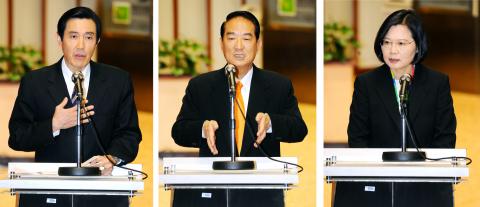The three presidential candidates crossed swords on issues ranging from cross-strait policy, the economy and administrative competency in the second of three televised platform presentation forums last night.
President Ma Ying-jeou (馬英九) of the Chinese Nationalist Party (KMT) chose “rectitude” as his theme, stressing that people’s trust was the most valuable government asset and corruption was the strongest corrosive of such an asset.
Ma asked why the Democratic Progressive Party (DPP) presidential candidate Tsai Ing-wen’s (蔡英文) proposed “10-year policy” did not contain the word “rectitude.”

Photo: Taipei Times
“Is it because rectitude is not important for Taiwan’s future, or because rectitude is, for Tsai and the DPP, a hot coal they dare not touch?” Ma asked.
Ma said the biggest difference between him and Tsai was that he met doubt and questions with clear explanations, but Tsai continued to avoid burning issues.
Tsai said that in the past four years the image of Ma in the eyes of the people had become that of a president that did not empathize with the people, and did not listen to others.
“What we carry with us is people’s expectations, not our own image,” Tsai said, alluding to her criticism of Ma that the latter only cares about his image and not the people’s problems.
Addressing the so-called “1992 consensus” issue, Tsai said that while Ma insisted on the existence of the consensus, he was also terrorizing the people of Taiwan by saying that if they did not accept the consensus all would be lost.
“Why can you not tell the people, President Ma, what price Taiwan has paid for accepting the ‘1992 consensus?’” she asked.
Tsai said she had faith in her proposed “Taiwan consensus” because it would follow a democratic procedure and would accept many opinions, which would dissolve the differences in Taiwan.
Refering to the allegation that the Ma administration has used investigation and intelligence agencies to monitor her campaign, Tsai asked Ma whether he “dare to ask the Bureau of Investigation to bring out the original documents.”
Ma stressed he has not issued a directive to monitor her nor has he received information from investigation and intelligence agencies on any surveillance of the opposition camps’ campaigns.
James Soong (宋楚瑜) of the People First Party referred to how his post-presentation news conference after the first forum was omitted by the state-run Chinese Television System (CTS), saying the attitude shown by the CTS and the Central Election Commission in handling the oversight was “typical bureaucratism.”
“It is this kind of bureaucratic attitude that makes the people want change, want to see what somebody else would do,” he said.
Pointing to the labels “corrupt” for the former DPP Chen Shui-bian (陳水扁) government and “incompetent” for the current Ma administration, Soong said that nobody ever heard of the provincial team serving under him being corrupt or incompetent.
“Voters should not vote for corruption or incompetence, but for my team, which is capable of delivering on their promises,” he added.

A Ministry of Foreign Affairs official yesterday said that a delegation that visited China for an APEC meeting did not receive any kind of treatment that downgraded Taiwan’s sovereignty. Department of International Organizations Director-General Jonathan Sun (孫儉元) said that he and a group of ministry officials visited Shenzhen, China, to attend the APEC Informal Senior Officials’ Meeting last month. The trip went “smoothly and safely” for all Taiwanese delegates, as the Chinese side arranged the trip in accordance with long-standing practices, Sun said at the ministry’s weekly briefing. The Taiwanese group did not encounter any political suppression, he said. Sun made the remarks when

The Taiwanese passport ranked 33rd in a global listing of passports by convenience this month, rising three places from last month’s ranking, but matching its position in January last year. The Henley Passport Index, an international ranking of passports by the number of designations its holder can travel to without a visa, showed that the Taiwan passport enables holders to travel to 139 countries and territories without a visa. Singapore’s passport was ranked the most powerful with visa-free access to 192 destinations out of 227, according to the index published on Tuesday by UK-based migration investment consultancy firm Henley and Partners. Japan’s and

BROAD AGREEMENT: The two are nearing a trade deal to reduce Taiwan’s tariff to 15% and a commitment for TSMC to build five more fabs, a ‘New York Times’ report said Taiwan and the US have reached a broad consensus on a trade deal, the Executive Yuan’s Office of Trade Negotiations said yesterday, after a report said that Washington is set to reduce Taiwan’s tariff rate to 15 percent. The New York Times on Monday reported that the two nations are nearing a trade deal to reduce Taiwan’s tariff rate to 15 percent and commit Taiwan Semiconductor Manufacturing Co (TSMC, 台積電) to building at least five more facilities in the US. “The agreement, which has been under negotiation for months, is being legally scrubbed and could be announced this month,” the paper said,

MIXED SOURCING: While Taiwan is expanding domestic production, it also sources munitions overseas, as some, like M855 rounds, are cheaper than locally made ones Taiwan and the US plan to jointly produce 155mm artillery shells, as the munition is in high demand due to the Ukraine-Russia war and should be useful in Taiwan’s self-defense, Armaments Bureau Director-General Lieutenant General Lin Wen-hsiang (林文祥) told lawmakers in Taipei yesterday. Lin was responding to questions about Taiwan’s partnership with allies in producing munitions at a meeting of the legislature’s Foreign Affairs and National Defense Committee. Given the intense demand for 155mm artillery shells in Ukraine’s defense against the Russian invasion, and in light of Taiwan’s own defensive needs, Taipei and Washington plan to jointly produce 155mm shells, said Lin,